chronicling my rewatch of The Untamed. this time I will show restraint and savor the episodes one at a time, right? right.
Don't wanna be here? Send us removal request.
Text


With only three weeks left until MDZS comment week starts, it's time to announce the daily prompts along with the general guidelines!
Prompts:
24.08. Signal Boost – Leave feedback on a fanwork with less than 5 comments.
25.08. Reread Love – Leave feedback on a fanfic you keep going back to or can't keep out of your mind.
26.08. About Time – Comment on a fanwork posted over a year ago.
27.08. “I love it” – Leave feedback that references one thing the creator did in their fanwork that stands out to you the most.
28.08. Podfic Love – Podfics usually get very few comments – be the change you want to see in the world and leave feedback on your favorite podwork.
29.08. Spread The Love – Comment on a work that you don't think gets enough love from the fandom.
30.08. Picture Perfect - Leave a comment for your favorite fanartist.
31.08. And All The Rest - Leave a comment on a type of fanwork we haven't mentioned yet: Meta, playlists, FMVs, etc. - the sky's the limit.
Guidelines:
This is a low commitment event to encourage people to leave positive feedback! The prompts are for you to take as inspiration, as a challenge, or to ignore them altogether. Participating in the raffle is entirely optional as well. We explicitly include all mediums of fanworks including things like playlists, edits or meta in this. Comment on the fanworks that you like and that speak to you!
146 notes
·
View notes
Text
Please tell me tell me tell me there's a 3zun reincarnation AU where Jin Guangyao and Nie Mingjue are finally reincarnated centuries in the future and they are both inexplicably (and separately) drawn to this one shrine that is well maintained but neither one can find any information about it anywhere, nor who it's a shrine to? No one else seems to come here. They've never seen an attendant or other visitor.
And after a few times of visiting alone, maybe they run into each other and meet and make slightly self-conscious, slightly unintentional flirty small talk about why they're here (JGY: Oh, I don't really know, it's a pretty little spot. NMJ: [raises eyebrow and smirks] You don't seem the type to travel several hours for just a 'pretty little spot' JGY: [shark smile] Usually I'm not. Then why are you visiting if you don't know anything about it? NMJ: [flushing at having been caught] ...Uh....)
Maybe they meet each other there a few times and get to know each other a bit, because they feel... familiar. It's weird. But nice? They chat, flirt a bit, maybe go out for drinks before or after the shrine visits a few times. Exchange info. Joke about why they keep coming back here.
But there's this kind of a strange urgency that keeps building, that feeling that happens when someone says 'I need to talk to you', anxious and pressing and unavoidable. They go more often, but it feels like looking, like waiting, impatiently, and the feelings when they're there aren't always flirty and fun.
Maybe something happens, maybe they decide it's just too weird, maybe one of them is having flashes of... Something. (JGY gets intense vertigo on one of their 'dates' by some stairs and the feeling that he doesn't want Mingjue behind him by them. Mingjue sometimes feels so frustrated watching JGY, he just wants to grab him, shake him and yell for no reason he can figure out. Maybe, if they kissed, they both get hit by the scent of blood and death and it unnerves them both so much, they stay away for months) But then they have to, they have to talk, seriously, about whatever the fuck this is that they're doing, that they're feeling.
And then. In walks. The most beautiful man. With gorgeous hair down to his thighs, pulled back into a ponytail by this white silk ribbon and it should look weird and out of place, but it's the more modern clothes he wears that seem wrong. But everything about him is right. Familiar as the shrine--familiar like the shrine, because it is so clearly his, though neither could say how they know. He owns it, protects it, cares for it. He cares.
And when he sees them, the broom drops from his shaking hands. And Nie Mingjue is suddenly crying for no reason? And Jin Guangyao has to just sort of sit down, right there on the floor, for some reason and fight back his own tears. And this beautiful man also has tears in his eyes, but he is smiling and it's like the sun and the best thing they have ever seen and nothing makes sense and what the fuck is happening and he says in this gentle voice, "I apologize for being late. Were you waiting long?"
And they both, for some reason very much feel that that should be their line.
2K notes
·
View notes
Photo
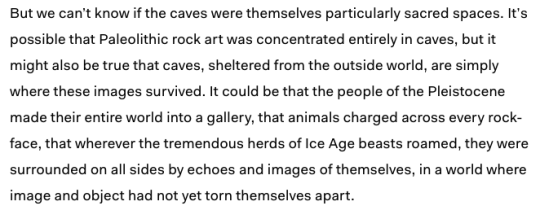
this makes me want to cry
203K notes
·
View notes
Text
A Piece of a Filial Pious Heart: Jin Guangyao through the Lens of Filial Piety
“The Jin Guangyao in my eyes and the Jin Guangyao in your eyes – as well as the Jin Guangyao in the eyes of the world – are all completely different people.”

Lan Xichen says these fateful words in episode 43 of CQL. And honestly, I think it’s really interesting to see the varied “Jin Guangyaos” in the eyes of different people in fandom!
Everyone weighs differently — how much Jin Guangyao’s varied motivations (from ambition to the search for dignity) contributes to the choices he ultimately makes; and even the choices available to him in the first place!
But in the English-speaking part of the fandom, I think what’s less explored is how much of a hold the traditional Chinese virtue of filial piety (孝 xiào) (deference to one’s elders, usually parents) had over Jin Guangyao’s motivations and choices available to him.
I suspect that an appreciation for how deeply entrenched the virtue of filial piety is in Chinese culture might make one more likely to be sympathetic to Jin Guangyao as a character. After all, the many self-defeating decisions that we see Jin Guangyao make regarding his father and mother — so much of it feels startlingly similar to stories of filial piety celebrated in Chinese culture. In countless other parables and proverbs about filial piety, Jin Guangyao would be valorised. But in MDZS, what we have is a tragedy.
In this post, I’m going to try to get at this, through exploring how filial piety might have influenced Jin Guangyao, namely through two of his fateful decisions — to continue serving his father even as he was being abused and going back for Meng Shi’s remains. I’d like to suggest that both can be read as a deconstruction of filial piety, as part of MXTX’s broader deconstruction of traditional family values as a modern author. But caveat as always that this is heavily coloured by my own experiences with the value of filial piety :P And this post is going to be long….
Keep reading
#mdzs#cql#cql spoilers#jin guangyao#chinese history and culture#mencius#confucianism#this is perfect
897 notes
·
View notes
Note
Sorry, not fashion history, but do you know the name of the thing that looks like a sand bed for keeping a fire to make tea on in the picture you shared as an example of ca 1750s beizi and pifeng?
You mean this picture?

I don’t actually know what this furniture item is called, I assumed it was a low tea table of sorts but I think you’re right that it’s used to make a fire. Maybe someone else with knowledge about 18th century Chinese furniture could answer this question?
137 notes
·
View notes
Text
There’s also a large grey area between an Offensive Stereotype and “thing that can be misconstrued as a stereotype if one uses a particularly reductive lens of interpretation that the text itself is not endorsing”, and while I believe that creators should hold some level of responsibility to look out for potential unfortunate optics on their work, intentional or not, I also do think that placing the entire onus of trying to anticipate every single bad angle someone somewhere might take when reading the text upon the shoulders of the writers – instead of giving in that there should be also a level of responsibility on the part of the audience not to project whatever biases they might carry onto the text – is the kind of thing that will only end up reducing the range of stories that can be told about marginalized people.
A japanese-american Beth Harmon would be pidgeonholed as another nerdy asian stock character. Baby Driver with a black lead would be accused of perpetuating stereotypes about black youth and crime. Phantom Of The Opera with a female Phantom would be accused of playing into the predatory lesbian stereotype. Romeo & Juliet with a gay couple would be accused of pulling the bury your gays trope – and no, you can’t just rewrite it into having a happy ending, the final tragedy of the tale is the rock onto which the entire central thesis statement of the play stands on. Remove that one element and you change the whole point of the story from a “look at what senseless hatred does to our youth” cautionary tale to a “love conquers all” inspiration piece, and it may not be the story the author wants to tell.
Sometimes, in order for a given story to function (and keep in mind, by function I don’t mean just logistically, but also thematically) it is necessary that your protagonist has specific personality traits that will play out in significant ways in the story. Or that they come from a specific background that will be an important element to the narrative. Or that they go through a particular experience that will consist on crucial plot point. All those narrative tools and building blocks are considered to be completely harmless and neutral when telling stories about straight/white people but, when applied to marginalized characters, it can be difficult to navigate them as, depending on the type of story you might want to tell, you may be steering dangerously close to falling into Unfortunate Implications™. And trying to find alternatives as to avoid falling into potentially iffy subtext is not always easy, as, depending on how central the “problematic” element to your plot, it could alter the very foundation of the story you’re trying to tell beyond recognition. See the point above about Romeo & Juliet.
Like, I once saw a woman a gringa obviously accuse the movie Knives Out of racism because the one latina character in the otherwise consistently white and wealthy cast is the nurse, when everyone who watched the movie with their eyes and not their ass can see that the entire tension of the plot hinges upon not only the power imbalance between Martha and the Thrombeys, but also on her isolation as the one latina immigrant navigating a world of white rich people. I’ve seen people paint Rosa Diaz as an example of the Hothead Latina stereotype, when Rosa was originally written as a white woman (named Megan) and only turned latina later when Stephanie Beatriz was cast – and it’s not like they could write out Rosa’s anger issues to avoid bad optics when it is such a defining trait of her character. I’ve seen people say Mulholland Drive is a lesbophobic movie when its story couldn’t even exist in first place if the fatally toxic lesbian relationship that moves the plot was healthy, or if it was straight.
That’s not to say we can’t ever question the larger patterns in stories about certain demographics, or not draw lines between artistic liberty and social responsibility, and much less that I know where such lines should be drawn. I made this post precisely to raise a discussion, not to silence people. But one thing I think it’s important to keep in mind in such discussions is that stereotypes, after all, are all about oversimplification. It is more productive, I believe, to evaluate the quality of the representation in any given piece of fiction by looking first into how much its minority characters are a) deep, complex, well-rounded, b) treated with care by the narrative, with plenty of focus and insight into their inner life, and c) a character in their own right that can carry their own storyline and doesn’t just exist to prop up other character’s stories. And only then, yes, look into their particular characterization, but without ever overlooking aspects such as the context and how nuanced such characterization is handled. Much like we’ve moved on from the simplistic mindset that a good female character is necessarily one that punches good otherwise she’s useless, I really do believe that it is time for us to move on from the the idea that there’s a one-size-fits-all model of good representation and start looking into the core of representation issues (meaning: how painfully flat it is, not to mention scarce) rather than the window dressing.
I know I am starting to sound like a broken record here, but it feels that being a latina author writing about latine characters is a losing game, when there’s extra pressure on minority authors to avoid ~problematic~ optics in their work on the basis of the “you should know better” argument. And this “lower common denominator” approach to representation, that bars people from exploring otherwise interesting and meaningful concepts in stories because the most narrow minded people in the audience will get their biases confirmed, in many ways, sounds like a new form of respectability politics. Why, if it was gringos that created and imposed those stereotypes onto my ethnicity, why it should be my responsibility as a latina creator to dispel such stereotypes by curbing my artistic expression? Instead of asking of them to take responsibility for the lenses and biases they bring onto the text? Why is it too much to ask from people to wrap their minds about the ridiculously basic concept that no story they consume about a marginalized person should be taken as a blanket representation of their entire community?
It’s ridiculous. Gringos at some point came up with the idea that latinos are all naturally inclined to crime, so now I, a latina who loves heist movies, can’t write a latino character who’s a cool car thief. Gentiles created antisemitic propaganda claiming that the jews are all blood drinking monsters, so now jewish authors who love vampires can’t write jewish vampires. Straights made up the idea that lesbian relationships tend to be unhealthy, so now sapphics who are into Brontë-ish gothic romance don’t get to read this type of story with lesbian protagonists. I want to scream.
And at the end of the day it all boils down to how people see marginalized characters as Representation™ first and narrative tools created to tell good stories later, if at all. White/straight characters get to be evaluated on how entertaining and tridimensional they are, whereas minority characters get to be evaluated on how well they’d fit into an after school special. Fuck this shit.
#this is perfect#media culture#so many questions#that we don’t know the answers to#but that we need to ask
77K notes
·
View notes
Photo










The Untamed + tumblr banned tags (2/2)
2K notes
·
View notes
Text
Huh, this feels pretty spot on.
I’ve been thinking lately of what post-canon looks like for the Twin Jades, and I think these reactions to parental trauma point to some interesting questions there as well. We all need ways to make sense of the world, and for these characters the key system for assigning meaning, for pretty much all their lives, has consisted of the Lan traditions and rules. So what’s next for Lan Xichen, with his world-view in ruins, or for Lan Wangji, who has replaced his adherence to the rules with an obsessive love for Wei Wuxian?
Is there a way for LXC to come to a more resilient coping mechanism / system for assigning meaning, and what would that look like?
It’s pretty commonly accepted that LWJ’s post canon is basically a happy ever after — but is that so? is the love enough, for making sense of the world they live in? There is also a poetic contrast to LWJ’s happiness post canon with LXC’s seclusion and grief/guilt, and the way that is juxtaposed with the years of grief after Wei Wuxian’s death. But considering how complex MDZS is under the surface of its central love story, I’m not sure the conclusions we are to draw from this would be that simple.
Something about how Lan Wangji and Lan Xichen took the same parental trauma and, due to their differing ages and characters and the somewhat different pressures they were under, came away with very distinct conclusions that mostly seemed pretty similar at first, since they were cast in the same mold, i.e. the Lan disciplines.
Both of them these under-parented kids trying to reconcile the message that the world is fundamentally just with the lived experience that it absolutely was not.
Lan Xichen comes away with this idea that justice is arrived at by keeping everyone happy--have I compared him to Jane Bennet yet, she's my reference archetype for this kind of eldest sibling--and working for the best possible final outcome. In which possibility he persistently has faith even when it fails to come to fruition; a disappointing compromise is just a lesson to do better next time.
This is a pretty resilient coping mechanism, since it can stand up to not only a lot of bad shit randomly falling out of the sky but to other people and even you fucking up supremely in a lot of different ways, and also to being harmed by enemies, because of course enemies will do that.
It cannot survive the sense of being totally helpless, or a loss without recoup or silver lining, because it relies on the conviction that you can bargain with the universe. That you are in a position to do so, and that the universe is disposed toward mercy.
(This I think is why he attached himself so intensely to Meng Yao--at his darkest moment, when everything was falling around him and he was alone, someone came and restored his faith in the world being, fundamentally, a good place, that will pick you up when you fall and offer second chances. Right up until it gets pulled out from under him, that's what that person means to him, every time he sees him again: that at its core life is kind, and you can be safe again after trauma.
The irony is imo less that this person is actually bad than that Meng Yao is the last person who believes that.)
Lan Wangji, on the other hand, younger and more rigid and somewhat more sheltered, comes away with the idea that bad things are the direct consequence of flawed actions. Punishment is natural law; on earth as it is in heaven; only perfection merits mercy.
(Mumble mumble Legalism I haven't read enough Chinese history to unpack that lol but.)
The advantage of believing this is that it frees you from the bulk of internal conflict. If bad things happen it's because they ought to. You can stop them from happening by doing everything right. There is no need therefore to be afraid, and relatively little need to be angry, and when you are angry it can happen in a contained, approved way, toward disruptions to the system.
This is not a worldview that can survive very many disruptions. It does not have a lot of shock absorption built in; to keep it mostly intact in the face of the universe glaringly failing to deliver requires, more or less, going systematically insane.
Plenty of people raised with these kinds of values do in fact choose to do that. If choose is the right word.
If our Lan Zhan hadn't already gotten his coping mechanism shaken up and expanded by Wei Wuxian and his charismatic undermining of the Lan Sect's system of making their laws appear to be the laws of the universe, I think he'd have been a lot more likely to break when the Wen took Cloud Recesses. Not in an obvious way, necessarily, not cracking up and screaming or berserking, and probably not even going into complete shutdown, but like. Retreating from reality a lot more.
Living way more completely in his own head, and lashing out more at people who threatened his elaborate, infinitely brittle mental architecture.
(In his worst moments, this is Lan Qiren.)
As it is, it takes Lan Wangji a long time and a pretty large amount of trauma to fully break out of this belief system, even once he's been confronted with its inadequacy to handle the actual complexities of the unstructured world.
(This is narratively important, I think, because Lan Zhan having gone through that growth is kind of the reward for the tragedy of the thirteen years; a cathartic grace note.)
And just when Lan Wangji's reached his success state on processing all that and been, essentially, rewarded by the universe with a Wei Wuxian, Lan Xichen's far more robust just-world coping mechanism is finally brought to its own shattering point. And how.
...also Jiang Yanli is a very similar person to Zewu-jun in a lot of ways, but not having been orphaned as a child or thrust into politics from a young age the scale of her ambition is more modest. But that's its own post probably!
2K notes
·
View notes
Text
not a day goes by that I don’t think of kid mingjue’s little flower hairpins and how they match his grown up flower hairpins
2K notes
·
View notes
Text
The Calligraphy in Su Manor 苏宅书法
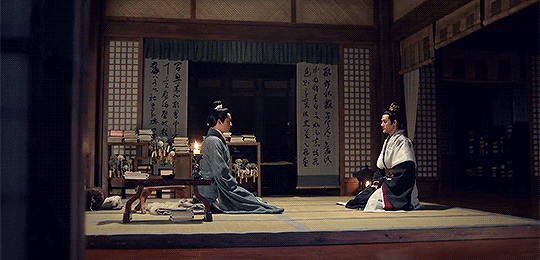
Calligraphy is one of the highest Chinese art forms, and displaying calligraphy in your house is a common thing to do whether you’re an ancient scholar or modern Chinese person with disposable income. As both art and writing, calligraphy simultaneously expresses the meaning of its text and the spirit of the one wielding the brush; as decoration, it imbues the surrounding space with its style and helps you project a certain image of yourself to visitors. Let’s take a close look at all the Su Manor calligraphy in Nirvana in Fire.
Though the calligraphy shown above is probably the most memorable, there are actually a total of five pairs (ten total) of hanging scrolls of calligraphy in the main room of Su Manor, plus the entrance calligraphy to your right as you enter. Here’s a floor plan of the room that I’ve redrawn based on a Chinese fan-made floorplan to highlight where the calligraphy are located, pair A being the main pair (arrows indicate the side you view them from):

Let’s start with the simplest, the four-character entrance calligraphy mounted to the wall, as seen here in wide view relative to the right scroll of Pair A and as a close-up:
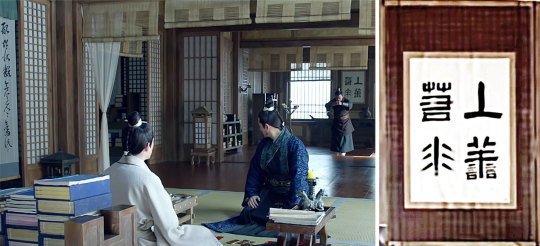
If you’re unfamiliar with ancient Chinese writing, it’s read top-to-bottom then right-to-left (Mainland China writing is nearly all left-to-right, top-to-down now, while Taiwanese and Hong Kong print are still mostly in the original orientation). These four characters, 上善若水, is a quote from Laozi, the founder of Daoism, in the foundational text Dao De Jing. The literal meaning is “Water is the highest form of being.” This is meant as an adage for how one should conduct oneself. The next few lines in the Dao De Jing explains it further: water provides for every living thing but doesn’t fight with any; water settles in places disliked by people, so it is close to the way of Dao. One should strive to be like water, content to be humble, to be of reserved character, to be kind to your friends, to speak as honestly as water is, to govern as orderly as water flows, to be as capable as water is, and to wait for the correct opportunity to make one’s move, like water. Only those who are non-confrontational like water will be free of worries (水善利万物而不争,处众人之所恶,故几于道。居善地,心善渊,与善仁,言善信,政善治,事善能,动善时。夫唯不争,故无尤). Mei Changsu is projecting an image of himself as a scholar striving toward Daoist and Confucian ideals, so it definitely makes sense that he would have something like this on his wall (not saying that he wasn’t actually striving for some of those ideals himself, either, but that’s more of a topic for another time).
Now, for the writing itself. This is a good time to mention that there are multiple distinct scripts in Chinese history (more on this later), and these four characters are written in a hybrid style borrowing from seal script (篆书; seal meaning engraving and not the animal) and clerical script (隶书), two of the oldest styles after the very ancient oracle bones script. During the Northern and Southern Dynasties, which NiF is loosely set in, seal script had already been largely reduced to ceremonial and decorative purposes (like all the overhead building signs you see in the show), and clerical script was a popular style of writing (many street banners and writing samples in the show were in this).
So here are the four characters compared to typical seal and clerical script characters from fonts (I say typical because these renderings have been popularized enough to become standard font sets in these scripts, but there are many variations and no one “true” way to write these characters), plus real samples of ancient handwriting that show some of the many extant variants:
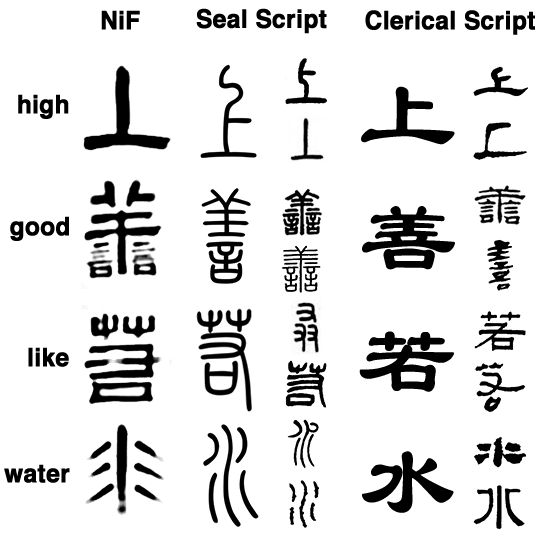
These samples are from shufa.supfree.net and humanum.arts.cuhk.edu.hk/Lexis/lexi-mf, two great sites for ancient calligraphy. Some things to note:
Good/善 and water/水 are relatively closer to clerical script while the other two characters are closer to seal script, but because clerical script evolved from seal script, there is a lot of overlap in its early forms with seal script, and the transition isn’t sharply defined.
Clerical script looks so much wider and shorter than seal script (and other scripts, too): that’s not me stretching pictures for no good reason—a popular explanation is that it was due to clerical script originating from writing seal script quickly with a brush on bamboo slips, and the texture of bamboo fibers led to the distinctive head and tails of the horizontal strokes as well as shorter vertical strokes.
Though I’m by no means an expert, I agree with the author of an excellent blog post on NiF calligraphy [1] that this calligraphy really doesn’t look very good. The strokes are crooked and sloppy in unsatisfying ways and the widths vary for no apparent reason. They’re neither like standard clerical script strokes, with the classic rounded and strong head and tapering flared tail (蚕头雁尾), nor standard seal script strokes, which should be balanced and of uniform width and strength. Most of the real samples look noticeably better to me.
Of course, rules are made to be broken, but when you’ve seen enough you get a sense of what’s convincing as a personal style, and what’s not. I have to imagine that Feiliu wrote this while Mei Changsu held his hand or something, and maybe that’s why Su-gege would prominently display this writing.
Keep reading
641 notes
·
View notes
Photo




OK, KK
(more BTS of My Centenarian Sweetheart / I am the years, you are the stars)
#liu haikuan#my centenarian sweetheart#bts iaty yats#the untamed cast#omg#I should probably admit that this blog#is not really focused on rewatching CQL any more#I mean I will get around to it#but meanwhile#I can just reblog clever meta and gorgeous gifs right?#especially of LHK/LXC#and all the rest of my faves
502 notes
·
View notes
Text
Personal top 5 in Wo Men De Ge / Our Songs, Season 1
After finishing all 12 eps of the 1st season of “Wo Men De Ge” / “Our Songs”, I am listing my personal top 5 pairs of “Young Singer x Old but Gold Singer” teams in the show, mostly just to have an excuse to gush and recommend some of my favourite performances from this beautiful, beautiful music show.
5. Xiao Zhan x Na Ying (and Angela Chang) - Team: Na Zhan Dui
What I really liked about them: The fact that they challenged many styles! Perhaps it’s because Xiao Zhan is currently an actor and not specialised in any music type, but their performances were among the most diverse. They did rock, disco, old Chinese classics…Singing-wise, Xiao Zhan does nice switches to falsetto, Na Ying’s voice is broad and with its own feel, and Angela Chang who replaced NY for a few eps has such a special and beautiful voice ugh. But what I liked most about them is probably Na Ying herself. Her outspoken personality and sense rly got to me and she was my favourite “Model Singer” in Group B. She was also so open to accompanying XZ in trying new styles and to put an emphasis on performance (as in, the visual aspect of it) to help XZ out. I think for someone who’s not currently a singer, he got very lucky she was his partner.
What I found to be a pity: Xiao Zhan sings pretty nicely, but it’s true that when you have Ayanga and Zhou Shen next door, it’s pretty hard for his voice to stand out. A few times, I found myself feeling like Na Ying or Angela was carrying the song single-handedly and couldn’t rly notice his voice anymore. Angela’s voice especially stands out, so sometimes, it feels like what I remember most from Na Zhan Dui performances is Angela’s great voice and the visual effects. Also, maybe it’s because he has to manage his image a bit more than the other young artists, but Xiao Zhan did come across as quite nervous during the entire show, including during many of the performances. If you only watch him based on this show, he comes across as just a very polite young person (with a pleasant voice).
Favorite performance(s) from them:
Gen Zhe Gan Jue Zou / Going with the Feeling (not rly a performance but the song with which NY and XZ got “blindly” paired up, and somehow the song in which he was the most relaxed imo)
Jun Gang Zhi Ye / A Night at the Naval Port (classic lovely song. Imo it was the song in which their voices matched up most seamlessly)
4. Xiao Gui x Luo Qi - Team: Wang Zha
What I really liked about them: I knew neither of them before the show, but felt like this team truly tried to make a new sound each time and to mix modern elements into old songs (which fits perfectly with the show’s theme). Luo Qi is so open to Xiao Gui’s suggestions and so humble about trying things outside her comfort zone, even though she is the senior. They also had a really nice old sister-little brother relationship, full of mutual respect, and it was kind of refreshing to have the young artist be like ‘it’s ok, it’s ok’ and being the encouraging or optimistic one in the team. Among the younger artists, Xiao Gui is the only rapper, so being on this show could be pretty challenging but Luo Qi being so open to trying new things made it work. She really went outside her comfort zone, and I loved this team for it. They are also both really pleasant - mostly quiet but polite and comfortable. All-round lovely pair.
What I found to be a pity: In a way, because Luo Qi was so accommodating and humble, sometimes it felt like Xiao Gui might have overpushed her a bit? Perhaps he could have been a tad more considerate, but we don’t see much of their interactions and overall they do seem like they have a good relationship.
Favorite performance(s) from them: Hui Lai / Come Back (the way the rap got mixed into this song feels so very natural)
3. Ayanga x Fei Yuqing - Team: (God Xiao Ge team names are hard to remember) Yun Dan Feng Qing
What I really liked about them: Well of course, the voices and the singing technique. haha I did not know Ayanga before this show, but HOLY SHIT. Not a musical actor for nothing. HE CAN SING. And he can sing so many styles, too. He is GOOD. Watching them, I thought, shit, among all the young artists we saw, only he could have been paired up with a senior like Fei Yuqing (and perhaps Zhou Shen, but we’ll come to him later). Their voices are distinctive, but the style in which they sing have certain similarities, so they match quite well. Basically, this is a team based on talent, skills and experience. They only sing songs that sound like classics but holy fucking shit, I loved the way they sang them. Other than the singing - and this is not a team thing - but I was rly surprised to find out that Fei Yuqing was quite funny. Individually speaking, both he and Ayanga were entertaining while remaining ever so pleasant. They were real pleasures to watch.
What I found to be a pity: I thought there was a lack of team chemistry, which could be in part due to how they got paired up, but yeah, they just never really felt like a team, more like two very polite and courteous singers who decided to work together for a few performances. Also, I am absolutely not surprised by it, but I guess, since it’s the Fei Yuqing, both young artists were fully accommodating him and not the other way round. It is not a bad thing in FYQ’s case because his singing is beautifully amazing and hey its his last show anyway, but it would have been fun to see more sparks here and there.
Favorite performance(s) from them:
Juan Zhu Lian / Rolling up the Beaded Curtain (haha are you ready for pure skills to fuck you up? I liked Juan Zhu Lian before, but this version is incredible)
Xin Yuan Yang . Hu Die Meng / New Mandarin Duck. Butterfly Dream (again pure skills but also the harmonising. a+++)
2. Liu Yuning x Ren Xianqi - Team: Jie Tou Pai Dang
What I really liked about them: This team is one of the teams that felt the most like a team. They have similar past experiences and I liked that they had a chill older brother + reserved younger brother chemistry. I also liked that they both seem to be people who are passionate about different aspects of music (like singing yes, but also music arrangement overall). Ren Xianqi was so open to letting Liu Yuning express what he wanted / add in the elements he wanted to each performance, or have LYN’s band be in charge of re-arranging the songs. Before this show, all I knew from Ren Xianqi was his “Xin Tai Ruan”, but I found him so lovely and nice during the whole show! He only had kind praise for all the other artists, was positive throughout, and well, Group A only had lovely “Model Singers”, but RXQ stood out in this respect. He and Liu Yuning had such a comfortable dynamics and many of the songs they sang happen to be all-time favourites of mine so of course bonus points. Singing-wise, I love Liu Yuning’s voice. It’s not like he can hit super high notes or anything, but this guy rly gets the right feeling out of each song through his voice. All in all, I loved the team.
What I found to be a pity: Literally, the only thing I find to be a limiting factor for this team is Ren Xianqi’s voice aaaaa TT. It felt like he struggled a bit at times, and compared to other senior singers, his voice doesn’t have as much of a distinctive feel, which I thought was a pity… Some of his uh…moves during some of the performances also felt a bit old-fashioned, but I think I can live with that.
Favorite performance(s) from them:
Tian Ya (the song…the arrangement…the spirit…the LYN’s singing…)
Ai Jiang Shan Geng Ai Mei Ren (mainly because this song is one of my all-time favourites and you cant go wrong with it, but this is not my favorite rendition of it either)
1. Zhou Shen x Li Keqin - Team: Qin Shen Shen
What I really liked about them: EVERYTHING FUCK HAHA. ok so. I started this show with pretty even feelings for all the teams, but if one team really grabbed my heart from ep. 1 onwards and threw it into the fire pit, it’s these two. GOD Can I even talk about them neutrally?? Chemistry-wise…where did they even get all this chemistry? No one knows. On stage, I don’t know if I’ve heard two voices that match as well as theirs when they harmonise before, but if I did, I don’t remember. Zhou Shen’s voice is high and floating like some kind of ethereal mermaid’s, while Li Keqin’s voice is so stable, so warm it’s the perfect match. But the chemistry off-stage?? It’s even more incredible??? If Liu Yuning and Ren Xianqi are like a pair of older and younger brothers, what are Zhou Shen and Li Keqin? No one knows, and certainly not them. All the terms have been thrown in: match made in heaven, perfect match, a couple that separated and had a child (thanks LKQ) but also father and son, ‘someone who likes music’ (what?)….but basically, everyone on the show agrees that their chemistry is uncanny and it’s not stopping them from continuing with whatever they’re doing. This team basically has it all and they know it: Singing skills and technique? they both have it. Passion for singing? They both have it. Perfect chemistry? They have it. Stellar and complementary sense of comedy and humour? They have it. Theatrical smoke as their only visual effect on stage? They have it (jk). Every episode that they’re on, I am laughing and smiling from ears to ears and thanking the heavens that they got paired up. Why are they like this.
What I found to be a pity: The fact that I can’t buy an album from them as a duo? hahaha OK, perhaps just the fact that they stuck mostly with ballads (except for Ye Lang Disco) and so I would have loved to see more sparks from them. But this complaint is also very empty because it’s not like I didn’t thoroughly enjoy every single ballad they sang…haha haha….Ah, one thing I found to be a veeerrrry slight pity is that, as ZS himself says, he’s quite insecure. In contrast, LKQ is quite optimistic, so it makes for a lot of comedic clashes in this respect (annnnd it becomes a thing I like about them again). OK ok one thing is perhaps that ZS’s jokes can be a little bit borderline, but honestly, they receive each others’ jokes so well it becomes part of their charm and chemistry………I guess I’m biased….ok….I’ll shut up
Favorite performance(s) from them:
Tian Xia You Qing Ren / All the Lovers in the World (oh my God oh my God oh my God thank you Zhou Shen for choosing this song)
Ye Lang Disco / Wild Wolf Disco (?) (BECAUSE THIS IS Qin Shen Shen AT THEIR FINEST: ABSOLUTE DORKS WHO SLAY AT PERFORMING. Na Ying mentioned this as the inspiration for her and Xiao Zhan’s disco challenge, and that’s for a GOOD reason.)
Honestly I thought Zhou Hua Jian should be there somewhere, because I am a HUGE fan of Zhou Hua Jian songs, but I did feel like his performances were a bit…slapdash in this show haha. And Yi Qiao seems very nice but most of the time, I didn’t feel her presence as much, and it felt like I was enjoying the performance because no matter what, ZHJ’s voice is fucking good. I also found it to be a pity that he had to constantly remind the audience about points and voting - in the beginning it was funny, but by the end it felt a little repetitive - and that some of his comments could be a little bit borderline and clumsy. So not in the top 5, but his team’s performance of “Qi Shi Bu Xiang Zou / In truth, I don’t want to leave” did make me cry. A lot.
Anyways, overall, I rate this show 10 / 10 and would encourage anyone who likes music to watch it! I know many people who watched the show are international Xiao Zhan fans, well, if so, you’ll see a lot of him at least! (and your attention might get snatched by some others if you’re not careful)
#wo men de ge#我们的歌#season 1#xiao zhan#qin shen shen#the duets by Li Keqin and Zhou Shen are the best thing ever#like seriously#perfect#and yes very much agreed on the others too
43 notes
·
View notes
Text
I am always on some level thinking about Lan Sizhui’s trauma, and this was only compounded for me on this rewatch, because I’d forgotten just how absolutely abysmal Wei Wuxian’s mental health is during the burial mounds farming commune stretch of the show. Just extraordinary emotionally volatile, prone to angry outbursts, and with the capacity to drop from soaring enthusiasm to plunging despair at the drop of a hat. And they’re all living in such close quarters that his erratic moods and unacknowledged trauma that he’s stewing in just kind of spills over into the overall environment.
And certainly Wei Wuxian is great with a-Yuan, and is a positive influence for him in many ways! But none of them are living in an optimal environment - they’re struggling to get by, and frequently short on food - and Wei Wuxian in particular has an entire festering host of Issues that the current situation is only exacerbating. He’s living in a place that traumatized him, and to some extent he feels trapped there - he chose to help the Wens, but now that he’s made that decision, there’s no going back, and he explicitly knows he has no other options at this point. He misses his family and Lan Zhan. He’s practicing a brand of magic that is wreaking havoc on his temperament and eating him from the inside, and he’s gone through a voluntary but nonetheless pretty traumatizing kind of body modification. He can’t be expected to function at his best, or do as right by the people in his life as he could if he were in a healthier place.
So of course a-Yuan is affected by this! He can tell that one of his favourite people is frequently stressed, that his moods are easily ruined by little interferences, and that he’s sad for reasons that are hard for a little kid to comprehend. a-Yuan gets yelled at for uprooting a lotus plant by accident - and sees Wei Wuxian, rather than try to replant it, declare the venture hopeless (you have to be careful what you do, all the time, because he’s always hovering over a pit of despair and any little thing could flip the switch!). a-Yuan witnesses Wei Wuxian become physically violent towards Wen Ning after the JZX stabbing fiasco. For most of that outburst, a-Yuan is crying in the background after getting a truly terrifying glare from Wei Wuxian.
Sharing an environment with someone who does not have access to the kind of coping mechanisms they need - and compounded with the fact that a-Yuan has already gone through a considerable amount of trauma due to being a war crime survivor at an incredibly young age - is it really any wonder that teen Sizhui has so many people pleasing impulses? Is so accommodating and acquiescent and pacifying, so inclined to mediate and de-escalate? I see people saying that it’s a wonder that Sizhui turned out so well compared to everyone else, but imo the way he turned out makes complete sense, and I don’t think that his interpersonal behaviour is entirely healthy either.
For me, what exemplifies it the most is this little exchange when they’re at the restaurant with Lan Wangji:



Wei Wuxian gets upset when the topic of Jin Zixuan comes up and slams his jug on the table in a sudden burst of anger; a-Yuan reaches out and gently puts his hand on his arm. It’s a very sweet gesture, but in in the context of everything else, there’s also something unnerving about it to me, in the sense that this toddler really seems to have internalized that it’s his responsibility to manage the emotions of his caregiver.
Aaaand what do we seem him do, in episode 2, as a teenager? Once again feeling responsible for managing the emotions of people older than he is; jumping in to bail Lan Wangji out of his extremely petty vow of silence by engaging in diplomacy for him and defusing a conflict based on a grudge that he doesn’t have the context for.
And I think that his relationship with Lan Wangji also compounded these same issues for him. When Lan Wangji comes out of seclusion and starts being a major figure in Sizhui’s life, he’s still pretty freshly grieving. Sizhui is likely one of the few bright spots in his life, and I’m betting Sizhui picked up on that, if perhaps only subconsciously, and developed a deeply protective impulse towards Hanguang-jun. Once again, feeling responsible for managing an adult caregiver’s mood. And again, of course Lan Wangji had plenty of positive impacts on Sizhui, and was overall a force for good in his life. But both Wei Wuxian and Lan Wangji have their own baggage that they’re not super great at coping with, and that has an unavoidable impact on Sizhui’s development as well.
4K notes
·
View notes
Photo









1K notes
·
View notes
Text
Rec: The Phenomenon called “Qin Shen Shen”
What is “Qin Shen Shen”?
Qin Shen Shen is a singing duo formed in 2019, in the 1st season of a Chinese music competition show called “Wo Men De Ge” aka “Our Song”. It’s made of Zhou Shen and Li Keqin, two experienced solo singers who met for the 1st time on the show. “Qin Shen Shen” is their team name.
But who are they?
1) Zhou Shen:
A singer from mainland China, mostly known for singing OSTs of C-dramas and movies, including CQL (Xue Yang’s theme) and DMBJ ChongQi.
28 years old. (5 yrs old, when together with Li Keqin)
Famous for his naturally high-pitched voice, similar to a soprano or mezzo-soprano.
Wants to lower people’s expectations, but keeps blowing people’s minds, so he’s stuck in a vicious circle of growing expectations and one-upping his past self.
Most famous song is called “Big Fish”.
Self-professed insecure.
Talks a lot.
2) Li Keqin:
A veteran singer from Hong Kong, who debuted 30+ years ago.
53 years old but is secretly 8 (3 yrs old, when with Zhou Shen)
Is known for having such great vocal stability when singing live that he earned himself the nickname: “CD-Qin”.
Will make mistakes in Mandarin but look really cute doing it
Famous songs include “Half-Moon Serenade” and “Great Auditorium Concert Hall”.
Is a good sport. Is good at sports.
*is stressed* *pretends to stay calm* *slays* *rinse and repeat*
So why should I check them out?
“Match made in heaven” is the moniker given to them the 1st time they sang together. That stuck for a reason. Li Keqin and Zhou Shen are a “1+1= greater than 2″. In theory, they’re worlds apart, but combining them sets off sparks. Whether it’s their understanding of how a song should be sung, their skills, or their style in singing duets: all match. On top of that, their voices’ timbre are weirdly complementary. Li Keqin’s baritone fits under Zhou Shen’s floating pitch like an anchor grounding them. Zhou Shen’s sound brings both voices to greater heights. The exponential added value they bring each other as a duo is just a rare find in any circle. In short: You’re in for a musical FEAST.

Chemistry. Chemistry. Chemistry. Complementary in some ways, similar in others, how they magically fit like a glove right off the bat is itself a wonder. Zhou Shen’s “prepare-for-the-worst” attitude goes hand-in-hand with Li Keqin’s apparent optimism. When one throws, the other’s there to receive. Sometimes they complete each other’s sentences, other times they’re like night and day…In all cases, what a team.

Laughs!! So many laughs! When they’re not singing, Qin Shen Shen is a full-time comedy duo. Throwing each other under the bus is a skill they acquired in 0 time and make use of daily. And if they’re not the ones throwing the jokes, they sure are receiving well. Dorks.

Cuteness overload. Both are just incredibly likeable and cute individuals onscreen. (yes both) Unbelievable. You have to see it to believe it.

A heartwarming dynamic. At the end of the day, QSS is a duo formed for a competition on TV. But even with the most cynical eyes, what you see is a dynamic between 2 very different singers of different generations, who have to get to know each other enough to collaborate in a short time, within a dynamic that fits. And it works! Boy do they make it work!!

Where to check them out?
If you’re short on time, some of their songs to pick from: “Under Mount Fuji”, “All the Lovers in the World”, or “Wild Wolf Disco”.
If nothing else, give their audio clip a chance: Clean vers of “Under Mount Fuji” without audience reactions, and a compilation of clean audios to cherry-pick from.
If you decided you want to see more of them, they’re a regular on “Wo Men De Ge/Our Song” S1: Ep. 1 with Eng subs. (More info on the show here)

Give the “match made in heaven” duo a try!! They don’t disappoint!
#qin shen shen#zhou shen#li keqin#wo men de ge#not the untamed#but at least zhou shen appears on the original soundtrack#so that surely counts
233 notes
·
View notes
Photo
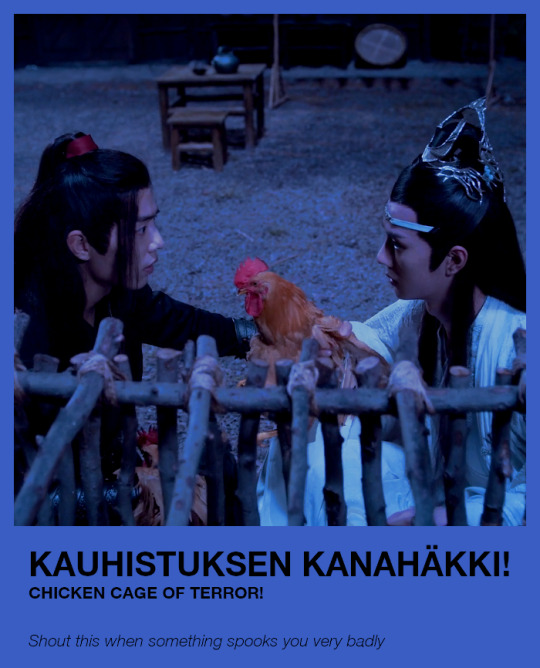
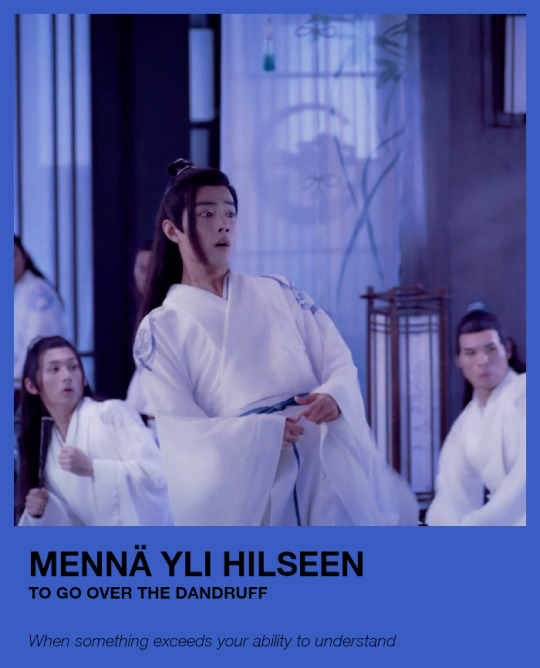

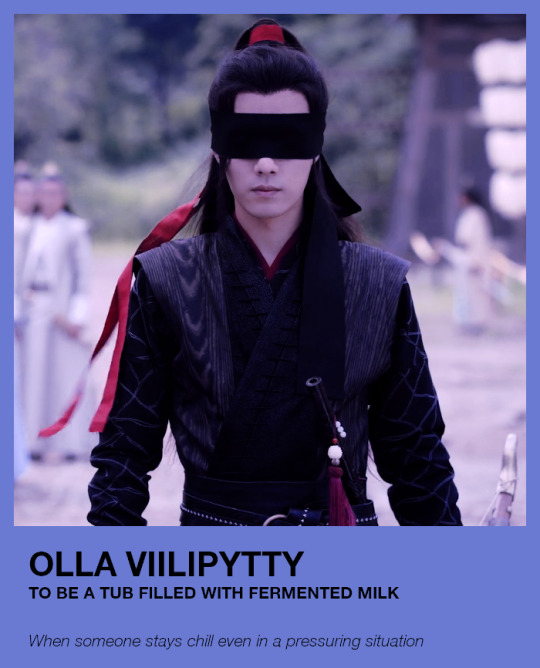
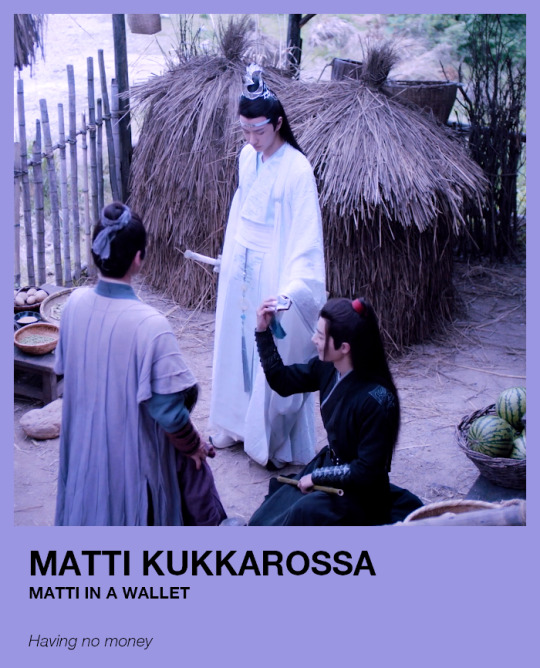

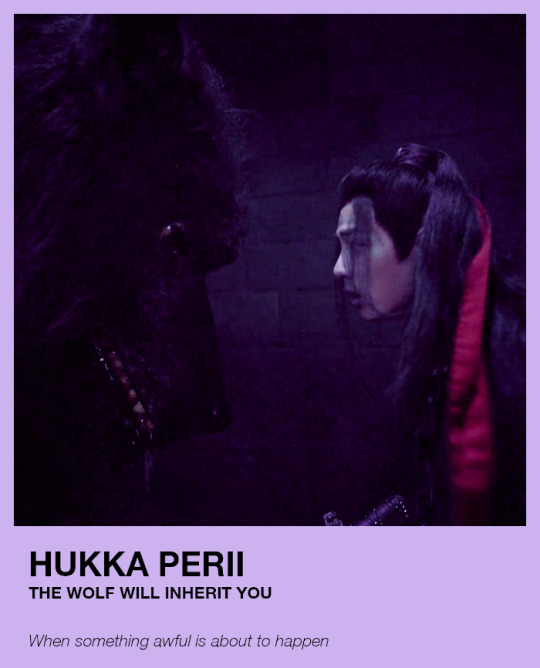



Learning Finnish Proverbs with Wei Wuxian
inspired by a finnish comic “Finnish Nightmares” by Karoliina Korhonen
+ bonus:

(i strongly advice clicking the pics for better quality and readability!)
712 notes
·
View notes
Text
This is pretty much perfect 🖤
I’ve also been thinking a lot recently about what post canon looks like for the Twin Jades, and this post pretty much convinced me that they could actually have a reconciliation arc.
This far I’ve had a hard time grasping what an LWJ/LXC reconciliation would actually look like? Since I hadn’t thought either of them had done anything that the other one would have any trouble forgiving. But this tiny moment shows a very fundamental conflict there and I love how @guqin-and-flute’s analysis brings it to the fore.
Lan Xichen Episode 42 ✨Face Journeys✨
karetahana said: Listen. i am here literally asking for the analysis if you feel like doing 🤩
OH, WELL IF YOU INSIST *turns with a lovingly embossed binder full of Xichen pictures* This is sincerely self indulgent and long as absolute fuck, just a warning. Bold is a direct quote from the show (Youtube/Netflix)
~~~
OKAY. Episode 42. We start at 30:20, Lan Wangji is sitting next to Wei Wuxian who is convalescing on Lan Wangji’s bed back at the Cloud Recesses after having been stabbed (bummer) during a disaster of a recon mission that landed not only him and Wangji in hot water with everyone (double bummer), but Xichen as well for demanding entry to Jin Guangyao’s secret room (triple bummer). Wuxian is worried about being back in the Cloud Recesses– “What if your brother finds out?” Enter Xichen, rocking up to the conversation with a fucking joke; “I found out already.” Letting him sweat a little, but as he sounds pretty calm, it’s mostly a ‘it’s hilarious that you think that I wouldn’t know about this, dude.’ (Bro, how are you so chill? How are you so good?)
They get up and bow as he strolls in. Wuxian apologizes for existing here, in his mountain and stuff. Xichen shakes his head with amused fondness;
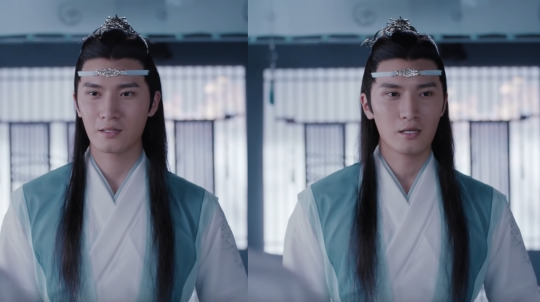
and hits them both with this smile that reaches his eyes and says ‘Nah, son, that was me. You can live here while they search for you ‘cause I’m nice and I like you.’
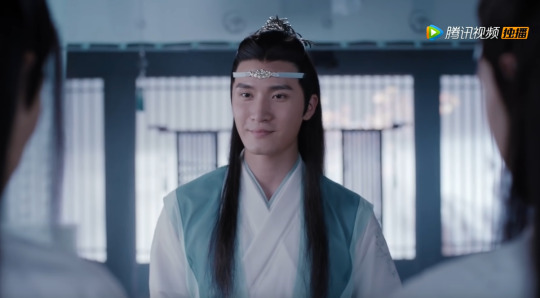
Genuine, comforting, and warm. ‘Glad to have you here, Wuxian.’
WWX and LWJ exchange a look–probably WWX asking for confirmation, LWJ giving it. Then, with zero further ado, WWX jumps right in with “Where’s Chifeng-zun’s body?”
Keep reading
498 notes
·
View notes